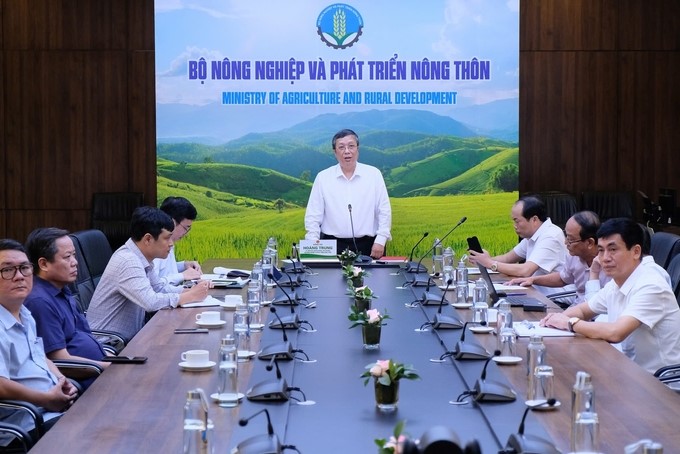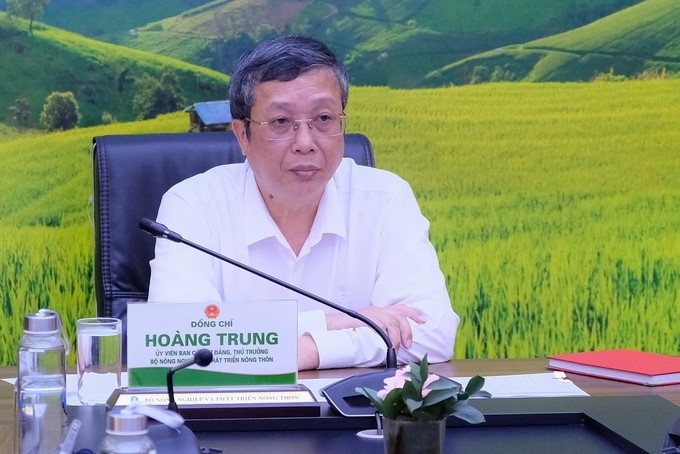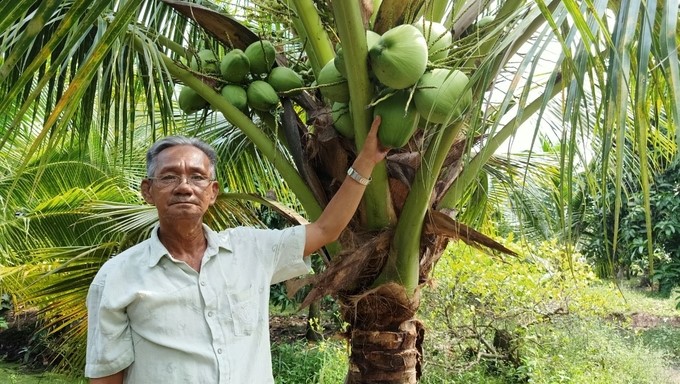May 20, 2025 | 03:44 GMT +7
May 20, 2025 | 03:44 GMT +7
Hotline: 0913.378.918
May 20, 2025 | 03:44 GMT +7
Hotline: 0913.378.918

Deputy Minister Hoang Trung exchanged with localities and businesses on compliance with the protocol to export fresh coconuts to China. Photo: Tung Dinh.
On the morning of September 6, the Ministry of Agriculture and Rural Development (MARD) held a conference to disseminate the Protocol on Fresh Coconut Exports to China to a number of units, businesses, and 15 key localities for this product.
Speaking at the conference, Deputy Minister Hoang Trung said that coconut is one of six subjects in the project to develop key industrial crops. Currently, the whole country has about 200,000 hectares of coconut farming with an annual output of over 2 million tons.
"Coconut is a product with strengths; all parts of the tree bring value, especially suitable for export and deep processing," Deputy Minister Hoang Trung informed and said that in 2023, coconuts and coconut products have been exported to 15 countries, with a volume of hundreds of thousands of tons.
On August 19, Vietnam's MARD and the General Administration of Customs of China (GACC) signed a protocol to export fresh coconuts to this billion-person market. According to Deputy Minister Hoang Trung, this is a very good opportunity to reorganize production, link, and expand the market.
"China consumes more than 4 billion coconuts each year, of which 2.6 billion fruits serve immediate consumption and 1.5 billion fruits are for processing, but this country's production capacity has not yet met, so this will be a big opportunity for Vietnam."
The conference includes two main contents. The first is to disseminate to producers, businesses, and localities to grasp the protocol's regulations. The second is to create space for exchange between the state management agency and localities, businesses, and people on this issue.
After the protocol's regulations were disseminated, Deputy Minister Hoang Trung emphasized that localities must closely follow the instructions and documents provided by the Plant Protection Department to review and re-evaluate before GACC implements the inspection work.
Besides, localities also need to arrange enough resources and people to carry out related work. If encountering any difficulties or problems regarding technical issues, localities need to immediately contact and discuss with the Plant Protection Department to resolve them.
Meanwhile, the Plant Protection Department is directed to provide technical support to localities. At the same time, continue to work with GACC to adjust some local recommendations, such as arranging more packaging facilities in large areas and reducing transportation costs for businesses and producers.
"The Plant Protection Department needs to direct the plant protection system at border gates to strengthen careful inspection and control of export shipments. If a violation or non-compliance with regulations is detected, the code must be temporarily suspended, and the source of goods must be temporarily stopped and notified to a specialized agency for handling," emphasized Deputy Minister Hoang Trung.
For businesses, MARD's leader requires close coordination with producers, associations, and localities. From there, comply with the protocol's regulations, be honest in purchasing goods, and ensure origin in places that have been granted planting area codes.

Deputy Minister Hoang Trung emphasized that the planting area code will be suspended if a violation or non-compliance with regulations occurs. Photo: Tung Dinh.
Participating in the conference as the main host agency, Mr. Huynh Tan Dat, Director of the Plant Protection Department, said that this is an opportunity for Vietnam's coconut industry to develop further. However, along with that come challenges for management agencies and localities in inspecting and monitoring processes.Therefore, Director Huynh Tan Dat suggested: "The parties must coordinate closely and work together to create the most favorable conditions for exporting fresh coconuts to China.
Previously, responding to the protocol's regulations, the representative of the Ben Tre Sub-Department of Crop Production and Plant Protection proposed that localities could establish a working group consisting of many specialized agencies to inspect, survey, and make recommendations to producers.
In addition, Ben Tre's agricultural sector also advised units to conduct their own inspections before GACC participates and discovered and corrected some errors compared to regulations.
Meanwhile, a packaging facility included in GACC's inspection list this time assumed that the planting area code will include many production households, so it should be considered common property, must have common responsibility, and when there is a violation, it is necessary to specifically verify to avoid affecting other households.
According to Mr. Nguyen Quang Hieu, Deputy Director of the Plant Protection Department, Vietnam's coconut industry is ranked 4th in total value in the world coconut market, and Vietnam's export of coconuts and coconut products in 2023 reached over USD 900 million.
In particular, Vietnam's import markets for fresh coconuts are mainly the US, Japan, South Korea, etc. Thus, expanding the Chinese official export market will create motivation for businesses to register for planting area codes and packaging facility codes to meet export standards, opening up a brighter future for Vietnam's coconut industry.

Coconut is a high-value industry, especially in export. Photo: Kim Anh.
Main regulations
The Protocol on Phytosanitary Requirements for Export of Fresh Coconut from Vietnam to China includes nine articles. Of which, pay special attention to the following points:
- Vietnamese fresh coconuts exported from Vietnam to China, including both fruits with green shells and short stems ≦5 cm and coconuts without shells, shall comply with Chinese phytosanitary laws, regulations and safety and sanitary standards and be free from quarantine pests of concern to China, branches, leaves, and soil.
- All growing areas and packing facilities exporting coconuts to China shall be registered with MARD and approved by both GACC and MARD.
- Before exporting, MARD shall send GACC a list of registered growing areas and packaging facilities for approval, and this list will be updated regularly. GACC will post this list on the website.
- All orchards registered for export to China shall establish quality management and traceability systems, apply Good Agricultural Practices, apply Integrated Pest Management (IPM) programs, and implement management programs to monitor growing areas for quarantine pests of concern to China.
- Monitoring and control of pests must be carried out under the guidance of technical personnel knowledgeable in phytosanitary aspects, and the technical personnel should be trained by MARD or MARD-authorized institutions.
- All growing areas must keep a record of pest monitoring and control, which must be delivered to GACC upon request.
- MARD or MARD-authorized personnel will supervise the processing, packing, storage, and transportation of coconuts for export to China.
- Before exporting, phytosanitary officers conduct plant quarantine inspections and sample 2%. During the first 2 years, if no phytosanitary violations are detected, the sampling rate will decrease to 1%.
- Vietnamese coconuts will be imported through all Chinese border gates allowed by GACC to import fruits.
Translated by Thu Huyen

(VAN) This was the assessment shared by experts at the workshop titled 'Assessing the Role and Potential of Low-Emission Rice Production Systems in Vietnam,' held on the morning of May 19.

(VAN) Cai Rong Port is the fisheries control center of Quang Ninh, helping to monitor fishing vessels, combat IUU fishing, and remove the EC's 'yellow card'.

(VAN) The German Agricultural Society (DLG) explores the possibility of establishing a mechanization service center in Vietnam’s Mekong Delta to support farmers in accessing and utilizing advanced machinery.

(VAN) On May 16, the Department of Water Resources Management, in collaboration with the Food and Agriculture Organization of the United Nations (FAO), held a signing ceremony for the GEF-8 project document.

(VAN) Food safety, mechanization, vocational training, and market opening are key areas of cooperation expected between the Vietnamese Government and the Federal Republic of Germany.

(VAN) Deputy Minister Nguyen Quoc Tri also expressed his hope that Cuba will soon overcome its current challenges, attain food security, and further expand cooperation with Vietnam.

(VAN) The project contributes to enhancing the resilience of communities vulnerable to the impacts of climate change, with a primary focus on local women.